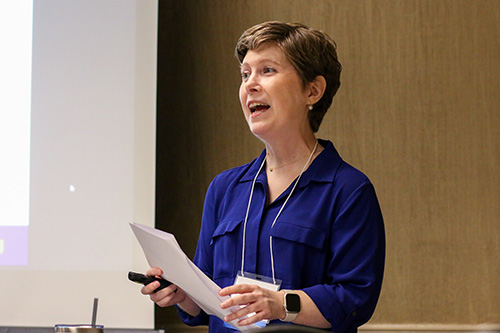Our Impact: Kristina Little, LCSW
During Social Work Month, we are sharing the impact that LSU School of Social Work has on our community and reminding you to join us for our Back with Impact event on April 26.

Kristina Little, LCSW, presenting on March 18, 2024 on Post-Disaster Mental Health Interventions: A Systematic Review at the NASW- LA Conference
Emma Torres
This week, we are featuring the work of Kristina Little, doctoral student in Social Work and researcher at the LSU Social Research and Evaluation Center (SREC). Through her PhD research, she’s working to help older adults be better prepared physically and emotionally to deal with disasters such as hurricanes. At SREC, she evaluates programs created for state and nonprofit organizations, works on data contributing to grants and manages a grant application website.
With a background in medical social work, Little uses much of her experience in oncology in the work she does today. “It’s a perspective that needs to be at the table,” she says. “I carried a lot of identity into my research job." Seeing the work of providers comes from a different perspective as a practitioner, she explained.
For her PhD research, she’s focused on preparing social workers to help older adults who’ve been affected by natural disasters through rapid response. Big contributors to these responses are organizations teaching psychological first aid, localized community mental health response teams and volunteers.
Little’s experience in oncology, social work and her SREC work helps to remind her that there’s a lot of contributors in her field. “There [are] good people everywhere,” she says. “Along with lots of organizations and agencies that care.”

Kristina Little, LCSW
PhD student, LSU School of Social Work
Research Associate, LSU Social Research and Evaluation Center
Emma Torres
When asked about Little’s work, the Director of SREC, Judith Rhodes, said, “Her collaborative nature fosters a productive and supportive work environment. Kristina is a pleasure to work with and our community partners would agree that her talents, expertise, and dedication make her a standout.”
Little also hopes to do more research on older adults who don’t want to leave their homes during these natural disasters. She says that helping them feel comfortable during their evacuation experiences can make a big difference. She looks forward to learning more about how to help older adults during storms and sharing that to benefit our community and improve outcomes when disasters occur.
The ultimate goal in her work, Little says, is to encourage people struggling with
mental health to get help after natural disaster events. Many of them put off seeking
help or don’t know if they need it. She explains that some survivors don't feel like
their situations are bad enough to seek help but decreasing the stigma around mental
health services can encourage assistance in these situations. She hopes to continue
to spread awareness about how natural disasters affect everyone in the community.